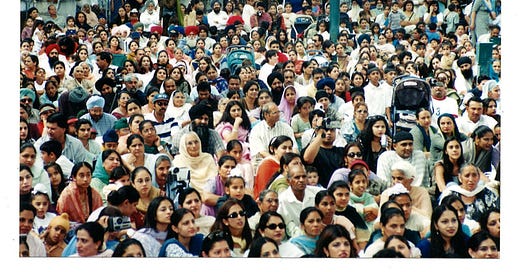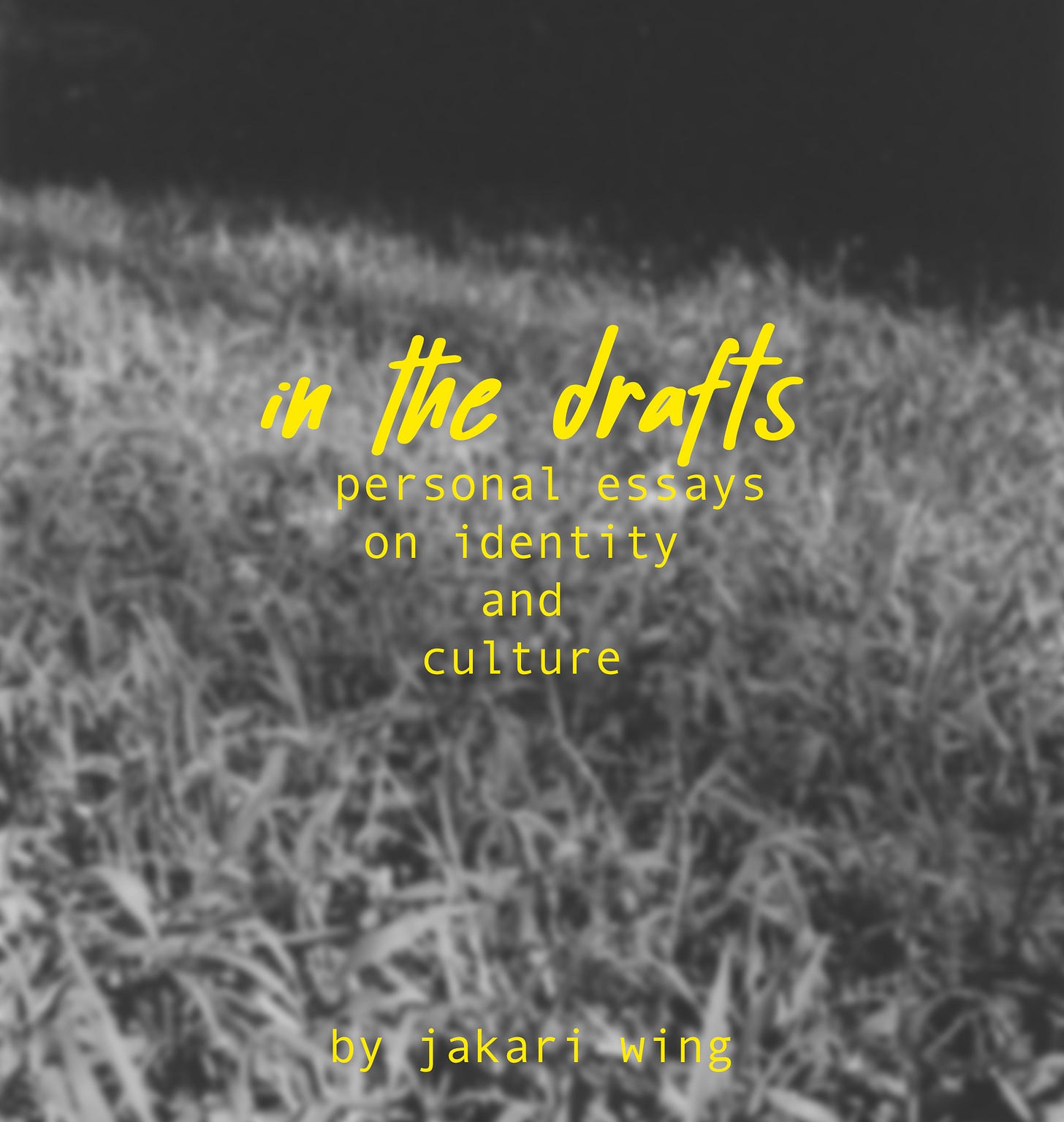Hello, welcome to my latest letter. In honor of reaching over 100 subscribers, I have something special lined up for this month. I’m so grateful for all of you, I never imagined I’d be this consistently vulnerable online, but here I am.
When I first started posting on substack, my goal was to publish at least 1-2 reads a month, I’m so proud to share that I’m on my 11th month.
For the next 3 weeks in a row, I’m sharing a series filled with many hot takes.
So…drum roll…
Presenting “IN THE DRAFTS”, a 3 part series of personal essays about culture and identity. Each letter involves big and small questions about my place here in the U.S.
Here is part one of In The Drafts. This was written in May 2023.
diaspora blues - on being de-cultured
photo taken in Yuba City, CA 2001 at the Yuba CityMela
When the sky is in the between phase, the sun having just set. The colors now escaping into another part of the world, I slip into my diaspora blues.
There is a part of me that will always wonder, why did my parents move to the U.S.?
I’m the 1st generation to be born in the U.S. and born in a hospital. Imagine centuries of one lineage coming through to the earth, being birthed in homes. Now birthed in buildings with fluorescent lighting and latex gloves.
When I was a candy striper, I walked through the hospital I was born in with my dad. We ran into this dr., my dad giggled, “jasdeep this man delivered you.”
According to my soul contract some part of me chose all this. Chose to live in a world filled with media and the internet. So much media and internet that even now i’m sometimes more comfortable online than irl.
I remember talking to these two very tall South Indian guys at a grad party last month. They moved to the US just a few years ago, both engaged to twin sisters from Ohio.
I told them I was from Yuba City, and although I was raised around a big population of Panjabis’, that that alone did not save me from the grip and influence of white supremacy.
“But now the times are different” I joked. Hoping they didn’t take my rant to heart or even worse, see the anxiety of their future kids.
We all awkwardly laughed and then they left.
I haven’t lived in my hometown since I was 18, but each time I return, the web of what influenced my upbringing becomes more clear.
I visited the Yuba City Mela the last time I was home. I heard my dad on the mic say to the crowd “we organize this event so we can connect our children to their culture.”
It has fallen on Memorial Day weekend for the last 29 years, american flags in every corner. Plastic red, white and blue wrapped on every trash can. The decorations are muted by pops of traditional Panjabi suits worn by the performers and crowd.
I brought my camera with me as I usually do. The only other person I saw with a similar set up was this older white gentleman with a backwards hat. He had a 100MM lens so he didn’t have to get too close to get his shot. I wore a bright pink suit, my lens was 35MM meaning I had to be physically closer to whoever I filmed. Many years ago, I was one of these kids performing on the stage, so it felt like I had more agency, permission. But did I?
My intention was to film moments of sweetness: the subtle nerves before the performers went up, parents getting their kids ready, biji’s standing proudly with their grandkids looking the part. Gestures of pride and intimacy I might have missed when I was little.
The first performance for me was when I was 4 years old. I had a giant smile on my face in a picture a found. In another photo I was 8, no smile.
I felt embarrassed seeing the photo with no smile. Was I really that ungrateful? Did I hate my culture? What was it that made me stop smiling on stage? Did I feel as if I was performing my own culture?
My mom often times scolded me that I was trying to erase the culture out of me when I stopped doing bhangra on stage. Or when I stopped playing kirtan in the gurudwara.
I started to believe her.
I tuned into this conversation on instagram live with these two influencers, one was an indigenous activist living Hawaii, the other was a mixed race lifestyle blogger touched by the Aloha Spirit (I say this with respect). They both collaborated on breaking down what it meant to embody the Aloha Spirit, and creating a bridge for visitors to become aware of their relationship to modern day colonization in Hawaii.
The activist reiterated that you have to feel, and embody love for yourself, your culture, to spread it. He also mentioned that if only people were inspired to connect with their cultures then they would be aware of the mistreatment of indigenous Hawaiians.
The Aloha Spirit is not just an exchange between two people, but a promise of care to your community.
He brought up the the word ‘de-cultured’.
Living in the U.S, the threat of being de-cultured is omnipresent.
Some vivid memories in childhood tend to surface.
One big one is the pronunciation of my name. I ran into my second grade teacher while I was at the mela in my hometown. She was the only teacher who pronounced my name the way my mom did. The only one who also spoke to me in Panjabi at school.
Whenever I showed signs of becoming actively de-cultured, my parents responded with shame. I don’t blame them, I think they were just so uncomfortable.
So then the bhangra practices and the kirtan practices felt as if they were forced on us.
Our performances weren’t good unless we smiled, our kirtan wasn’t impactful unless we closed our eyes.
All things that implied we need to perform our culture, vs feel it.
The reason I stopped smiling was because every cm of my blood wanted to rebel.
It was nice to see in the photo that even on stage I remained strong-willed. I would not do something I was forced to do, I would not smile. My point was proven through a frown while dancing to bhangra, which is really challenging to do because the dance is designed to make you smile. Also I want to add that bhangra was created in response to being on the land in Panjab. A dance that is tied to the land. So if my body felt connected to the act of dancing, why did I have to perform it?
What does it mean for someone like me, who was de-cultured, but also simultaneously raised in a large population of people who looked like them?
There was one artist at the mela who sang from Pakistan.
I thought how bizarre it was for a group of people to be reminiscing so hard about our ancestral land, embracing nostalgia together amongst one another in Yuba City, CA. The wind was especially pleasant in that moment. I looked at my Biji’s face (she’s 93) and wondered if she felt anything, or if the speakers were too loud (they were VERY loud). Or if she understood when the performer said more reverb please.
If you scroll back up to the picture of the crowd in my letter, on the left side of the photo near the fence. A man with a light blue turban, white beard is sitting with a smile. That’s my Nana Ji (my maternal grandpa). He’s at the mela but 2001, my favorite mela where I saw the Safri Boyz and B21. I wonder if he saw me on the stage, without a smile on my face.
I’ve been deeply connected to my culture my entire life, despite what elders may say or think when they hear me speak english more comfortably than Panjabi. This doesn’t mean that I’ll give up on learning my mother tongue, but the journey in connecting with my ancestors is one that is filled with both tension and reward.
I’m kind of still ashamed about being de-cultured, or writing this in english, or I guess even wearing red, white and blue on accident even though the colors look good together.
I’m kind of exhausted from having to understand why my parents came to the US and what it really means.
I guess I’ll substitute that question with more time in nature, because that seems to be the only thing that brings my heart immediate relief.
And also by making grammatical errors in my newsletters because sometimes I feel that too is an act of decolonizing my tongue lol.
…Or maybe i’m making excuses for never rereading before I post because it’s too mortifying to know that i’m sharing this all with you.
I will end by saying that one place where I feel so free to experiment is amongst my queer community. Really because we all have so many different backgrounds, we are so rich together, all finding comfort in our explorations. And it’s not like I’m looking for this monoracial space to find enlightenment, but maybe I’ve been groomed to think that if I’m not performing my own ancestral culture, then I’ll remain in constant yearning and confusion.
But I will not. I feel at home right here.
In this between. I feel at home whenever I swim in any body of water. Or when I feel the air in California. Or when I intuitively know what plants are poisonous or not. Or when I hear movement in the bushes and immediately know whether it’s a rattle snake or lizard. I do feel like I can be connected deeply to myself despite being away from my ancestral land. I do feel like earth is one big planet and that we are tasked with the challenge of fighting for oneness and scavenging for answers while fulfilling our body/soul’s needs.
I think what I mean to say is that, even though I’ve been disconnected from my culture by living in the US, if my ancestors are in my heart, then I will always be connected to my culture. And absolutely no one can take that away from me.
OK BYE
xx
Jakari Wing
venmo: @jakariwing
Thank you for reading! Support and see you in the next two letters!
Happy Full Moon in Capricorn
XX





<3